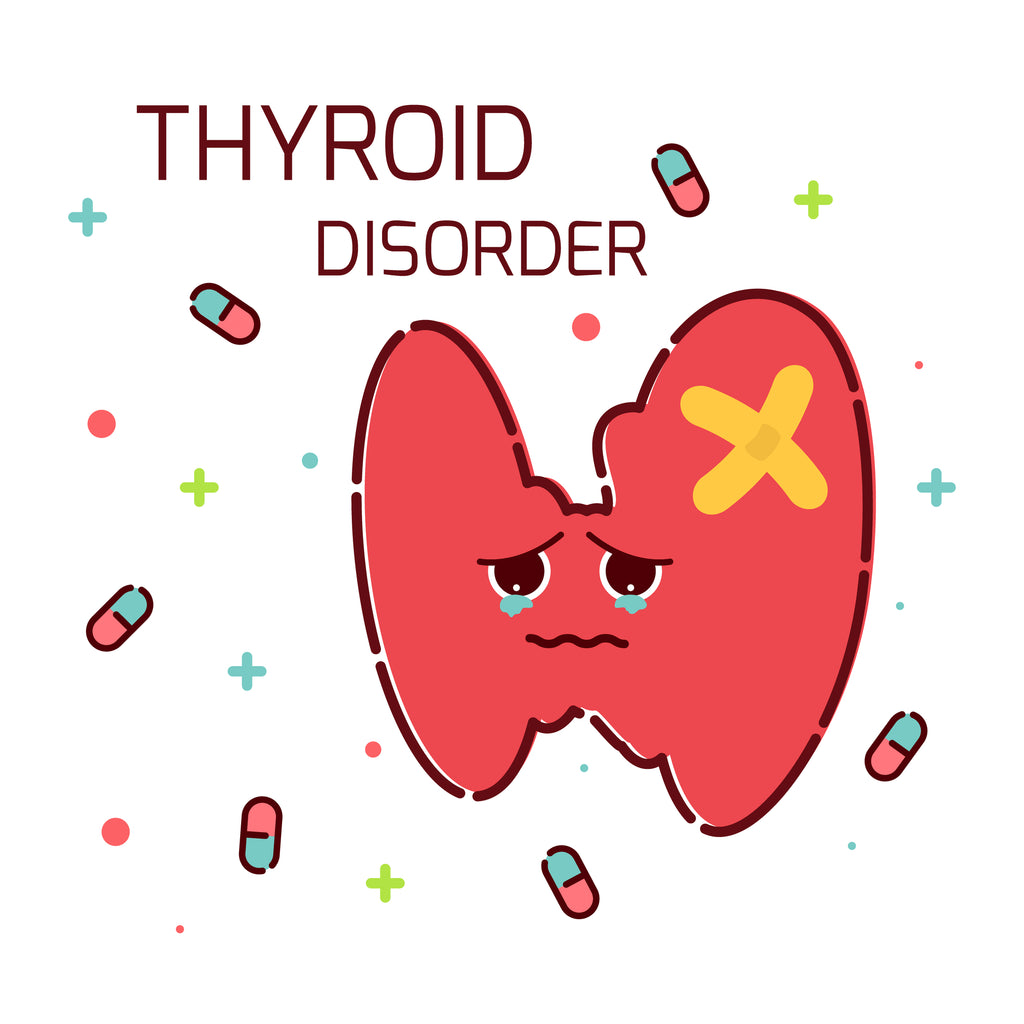Intermittent fasting- its popularity is consistently on the rise and for many reasons. This unique approach to a healthy and fitter lifestyle has been reaping multiple benefits for people, such as better control of inflammation, weight loss, and better blood sugar control.
Recently, this dietary plan has been making rounds on the internet due to its connection with thyroid health. But how are intermittent fasting and the thyroid even related? Is it even safe to try this diet if you suffer from a thyroid problem?
This article will review intermittent fasting in detail, its benefits, and whether or not you should practice it if you have a thyroid problem.
The Thyroid Epidemic: How Diet and Lifestyle Affect Thyroid

Before we talk about the connection between fasting and thyroid, let’s briefly discuss the thyroid gland and how our current dietary habits and lifestyle are affecting it.
There is no doubt that the incidence of thyroid problems is on the rise. It has now reached the point where it has potentially become a silent pandemic with over 200 million people worldwide suffering from it. So what is it that’s spreading this disease so much? It’s just a tiny little gland in your neck after all.
Several factors account for this increased burden of thyroid problems. The most important of these factors is an over-burden of toxins such as fluoride that enter into your body through polluted water, food, and air. These toxins accumulate in the thyroid gland and interfere with its functioning. (1) Then come the dietary factors, such as an iodine deficiency, excessive use of soy, or simply eating too much, which leads to obesity, ultimately setting the stage for thyroid problems. (2)
Other lifestyle factors that contribute to an increased incidence of thyroid problems include:
- Smoking, which may cause up to a 5-fold increase in all sorts of thyroid problems
- Increased exposure to X-rays and other radiations
- Too much stress may alter the thyroid receptor cells, making them resistant to the thyroid hormones (3)
- Poor sleeping habits, which leads to stress and consequently, poor thyroid health
What is Intermittent Fasting?

Contrary to the popular belief, intermittent fasting is not a diet but a pattern of eating. It includes scheduling your meals in such a way that you keep enough calories coming in while avoiding any weight gain. (4) This unique approach involves changing when you eat instead of what you eat. (5)
Intermittent fasting comprises two phases: the fasting phase where you restrict your calorie intake, and the eating phase where you can finally allow your body to eat. For example, in the famous 16/8 approach of the intermittent fasting, you fast for 18 hours straight followed by an 8-hour eating phase during which you can have your meals.
But why is it so important to change the time you consume your meals?
For starters, it is a good way to cut down on pounds without restricting your calories to an extent that you are practically starving yourself throughout the entire diet plan. Moreover, it is a great way to maintain your muscle mass while losing weight. Studies have even proven that it can exert powerful effects on your body as well as your brain, and may even extend your life span. (6,7)
Benefits of Intermittent Fasting
Multiple studies have investigated the way intermittent fasting works in human and animal models. Most of them have successfully concluded that this dietary approach possesses powerful benefits some of which are mentioned below.
Weight loss
Following intermittent fasting can help you cut down belly fat and lose weight without having to follow extremely restrictive diet plans. (8)
Insulin Resistance
Intermittent fasting has also been found to lower blood sugar by 6% and insulin levels by 31%. These effects can prove to be protective against developing diabetes type 2.
Inflammation
Some studies have shown that intermittent fasting tends to lower the risk of many chronic problems by reducing inflammatory levels in the body. (9)
Heart Health
Intermittent fasting helps reduce the levels of blood sugar, triglycerides, and LDL cholesterol, all of which are important risk factors for cardiovascular complications. (10)
Brain Health
Intermittent fasting can boost the levels of BDNF, a brain hormone that stimulates nerve cell growth and protects against diseases like Alzheimer’s. (11)
Anti-aging
Intermittent fasting can also exert anti-aging benefits in the users, increasing the life span by 83% in animal models. (12)
Intermittent Fasting and Thyroid: What’s the Connection?
Fasting and the thyroid are indeed connected, especially because fasting directly affects the metabolism and energy consumption within the body. According to the latest research, intermittent fasting tends to cause a drop in T3 thyroid hormone while increasing the reverse T3 or rT3. While the T3 hormone is important for the body for optimal energy release, its levels drop during intermittent fasting because your body has to go without food for long hours and needs energy conservation during this period. This drop in T3 is said to occur due to a decreased rate of conversion from T4 hormone to T3. But once the normal pattern of eating is restored, this balance is regained. (13)
At the same time, fasting does seem to have at least some benefit for the thyroid. For example, a research study has found that all the levothyroxine you consume during a fasted state get absorbed maximally and leads to more efficient results as compared to the one consumed during a regular day. (14)
Intermittent fasting & Hashimoto’s Disease

Metabolism and diet seem to play an important role in regulating the immune system. These factors are what decide which type of immune cells and how many of them must be produced inside the body. This naturally implies that any problem with metabolism can cause immunity-related problems as well, leading to many types of autoimmune diseases (15,16)
Hashimoto’s thyroiditis is a type of autoimmune thyroid disorder, and while no direct studies have evaluated its link with intermittent fasting, deductions can be made based on the basis of existing evidence. For example, intermittent fasting has been found to reduce the inflammation in many autoimmune diseases, like multiple sclerosis, rheumatoid arthritis, and diabetes type 1. (17,18,19)
What About Alternate-Day Intermittent Fasting?
A study conducted on people with the subclinical hypothyroid condition as well as a normal thyroid condition were made to undergo alternate-day fasting for six months. The researchers found that both groups of participants lost both fat and overall body weight in equal amounts. However, in patients with subclinical hypothyroidism, improvements in insulin resistance as well as fasting insulin levels were also observed. (20)
Optimal Duration of Intermittent Fasting
There are no direct guidelines about how long it takes for intermittent fasting to work specifically on people with thyroid problems. However, most research studies performed on this dietary approach alone have found that a timeline of 2 to 6 months is enough for intermittent fasting to control inflammatory levels and induce weight loss. However, remember that the exact amount of time to observe intermittent fasting is highly variable from one person to another. (21)
Dietary Tips for People With Thyroid Problems to Follow
Intermittent fasting has been a popular diet plan for a lot of people, including those with thyroid problems. While there are studies that prove this dietary approach’s benefits those patients with thyroid conditions, it is also speculated to cause certain side effects, especially if no additional care is taken.
If you suffer from a thyroid problem and wish to try intermittent fasting, make sure to follow certain tips mentioned below.
Talk to a Doctor
Before trying anything new, it is always a good idea to discuss the idea with a physician. A suitable doctor might be able to advise you on whether intermittent fasting is actually safe for you or not.
Take Baby Steps
It is never a good idea to rush things, and the same rule applies when it comes to trying out intermittent fasting. So remember to take things slowly and begin with a 14:8 or 12:12 hours protocol. If you directly jump from being a regular eater straight to a 16-hour long fasting period, you’ll essentially be pushing your body into starvation which may not be good for your thyroid.
Don’t Exercise Too Much
Exercising too much while fasting can lead to quicker depletion of your thyroid hormones.
Avoid Taking Painkillers During Fasting
Avoid taking any painkillers in a fasted state, and if possible consume them during your eating phase i.e. the time when you are allowed to eat during intermittent fasting.
Get the Right Vitamins
Stock up on all thyroid-healthy vitamins including selenium, zinc, omega-3s, and iodine. Your thyroid will thank you.
Don’t Stress Out
It is normal for people to stress out while following something new, including intermittent fasting. But make sure you have your stress levels under control as it can harm your gut and may take a long time to fully recover.
Watch Out for Thyrotoxicity
If you are following intermittent fasting and start noticing some unusual symptoms like palpitations or shakiness, it may mean you are overloading on thyroid hormones, leading to a state called thyrotoxicity. So before the problem gets worse, get to your doctor immediately.
Intermittent Fasting-Thyroid Connection: Concluding Thoughts
Due to the current dietary habits and lifestyle, thyroid problems are currently on the rise. While intermittent fasting has emerged as one of the potential solutions to manage this problem, the truth is, not enough scientific data exists to prove it beneficial for the thyroid. So if you are considering trying out intermittent fasting but not sure how it will go for your thyroid, make sure to check in with a doctor for safety reasons.








2 comments
I have hyperthyroidism and feel that Intermittent Fasting is an excellent benefit for my health. My stomach doesn’t get blooded anymore, and I don’t crave sweets. One of my coworkers told me about how Intermittent Fasting could affect my thyroid, and she always tries to play doctor with me. She claims that I have bad moods, and the truth is that she is unfair in distributing the job. I’m an outspoken person when there is unfairness, so she gets on my nerves. I’m happier doing this diet.
Hi! Do you have any info on intermittent fasting after total thyroidectomy? Thanks